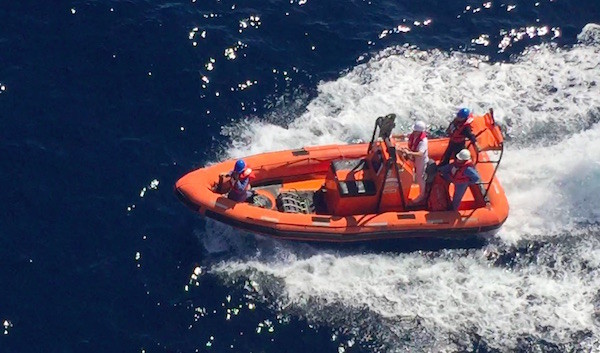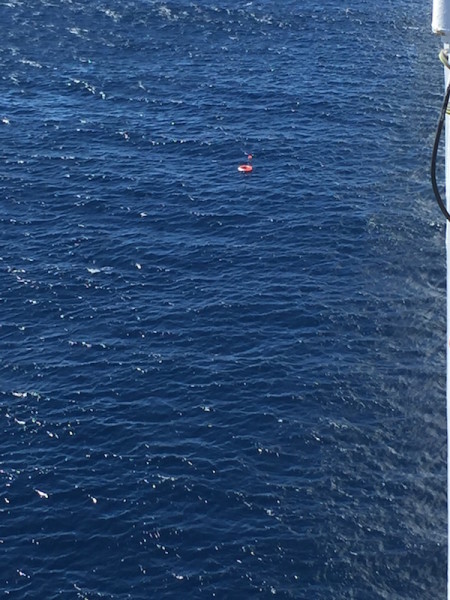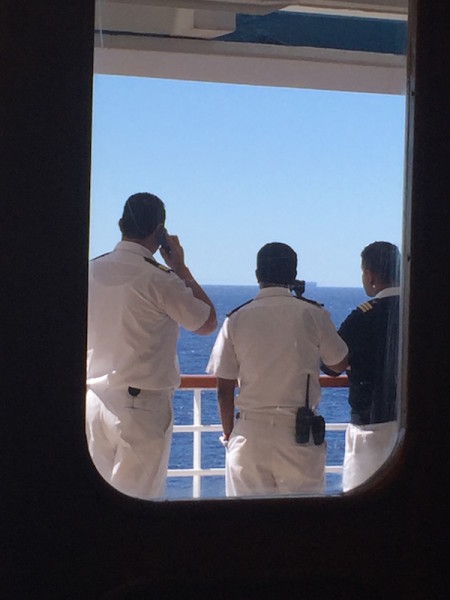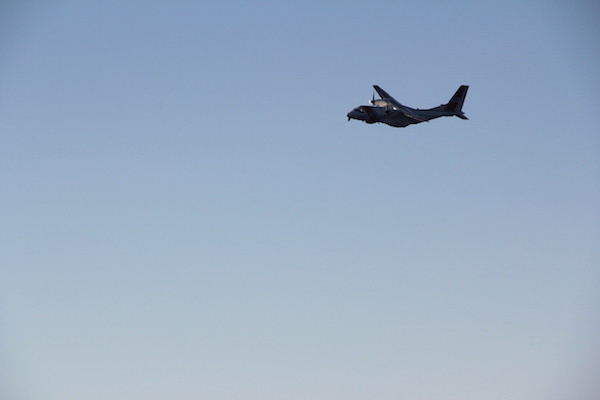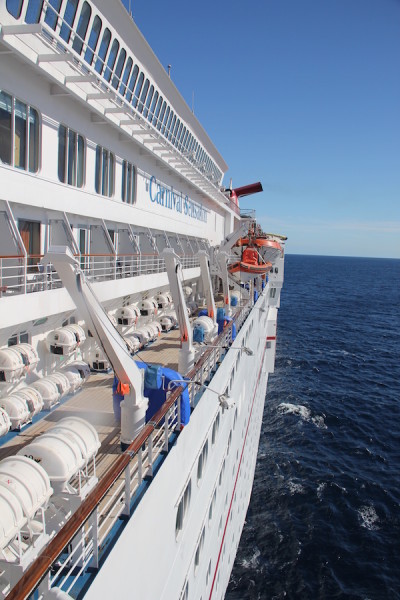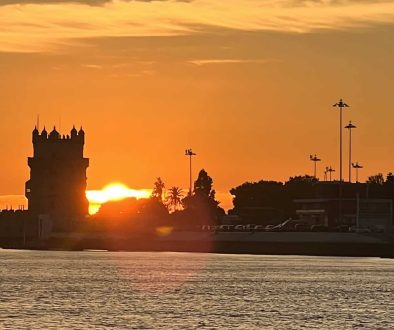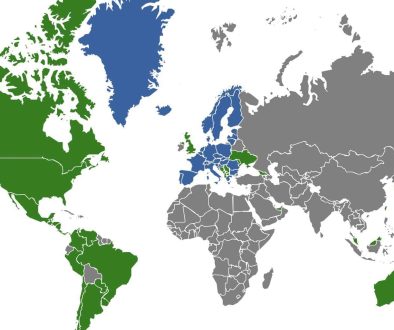What Happens on a Cruise Ship When There’s a Report of Man Overboard?
It was early afternoon and we were just settling in to eat some food I’d brought back to our lounge chairs on the upper deck area of our cruise ship when the horns sounded an alarm and a voice came over the intercom system, announcing a report of a ‘man overboard’ on the port side.
My initial reaction was to question what I heard…did they just say someone went overboard on both sides, or the port side? And which was the port side again? I wanted to think left, but had to figure out whether I was facing the front or back of the boat at that moment, since that’s the left that would matter. I didn’t really need to give it much thought, because instantly, a significant number of passengers headed to one side of the ship to start looking for the person in the water.
I asked my mom to stay with my kids in the lounge chairs while I joined the others looking over the side of the boat. Why would I want to look? Well, first, out of shock that such a thing had happened—my mind was still having a hard time wrapping itself around it all…then, out of hope that maybe I could help locate whoever might be out there in that cold water. I’d certainly want the entire ship looking for me if I was the one who’d fallen off the ship.
My mind was also wondering how it happened…after all, it’s really not easy to fall off of a ship, or at least not any cruise ship I’ve been on, and I’ve been on at least one from Carnival, Disney, Royal Caribbean and Princess Cruise Lines. There are high handrails and, sure, you could climb up them and probably fall overboard with the right gust of wind, but everyone is told in safety briefings the very first day on the ship that climbing the railings is not permitted. Sitting on your balcony railings (if you have a room with a balcony) is also not allowed. Of course, as a mother, I’ve worried that my children might not be careful, but it’s a danger we are all well aware of when cruising. We take extra precautions. So, in this case, I couldn’t help but worry about who had gone overboard…was it a child? Was it someone who maybe had too much to drink on this day at sea? Could someone have been pushed? Surely it wasn’t windy enough today to have blown someone off the ship (the previous days had been extremely windy, and they’d even roped off the area where we were sitting today, but this day was much milder than those).
Standing by the railing at the top deck during this emergency, it didn’t take long for someone to point to a bright orange life preserver floating in the water a good distance from the boat. At that point, the crew had already started to turn the ship around in an attempt to go back and search for the person in need. Or, maybe, to pick them up…at least that’s what I was hoping. But, the sight of the floating object made me hopeful that the person in need was holding on for dear life—just waiting to be rescued.
A small boat was launched into the water with what looked like half a dozen crew members on it as the ship made its way in the direction of the small orange float. It was clearly not going to be a quick journey, so I went to my room to grab my camera with the longer lens, thinking it might serve as a set of binoculars for me, making it easier to see into the distance clearly. I had plenty of time to go to my room several floors down and on the opposite side of the ship. When I made my way back up to a spot that felt like it offered a better view, our boat and the life preserver were still a good distance apart. I offered my camera to crew members, thinking they might have a better idea of what to look for—and where, but was told they had it handled at the captain’s bridge (where they pretty much control the ship and have all the tools for these kinds of emergencies).
After what seemed like an eternity, and was probably closer to 10 to 30 minutes (I wasn’t watching a clock), our ship was within a football field’s distance of the life preserver and it was clear, there wasn’t someone holding on to it. My heart sank.
The crew on the rescue boat motored over to the small, orange, circular float, scooping it out of the water, while the rest of us watched from above.
At this point, stories started circulating around the ship. One crew member told me he thought someone might have just thrown the life preserver off the boat—as a hoax—but the crew was required to treat it seriously. He said it was his first situation involving a case like this in his three years of working on the ship, beyond the drills they held to train for such an emergency. Another crew member, someone who was part of the entertainment staff, told me it was not a hoax, that he was told someone did physically see someone go overboard. But he didn’t know much more than that.
Some more time passed and the crew announced we’d all need to get our room keys (which also served as an identification of sorts, connected with a digital photo of each passenger) and report to a certain section of the ship. It was all very orderly, with them calling for us floor by floor, based on our room assignments. We realized this was a process of elimination of sorts, so that they could see who was not on the ship, possibly to confirm who was missing, if anyone truly was gone. Once we checked in, we could go back to whatever we were doing, and at this point, most people had gone back to their fun. I was intrigued by the entire procedure, and at this point, wondering why more rescue boats weren’t out in the water looking for our missing person. I’d been told that the Coast Guard had been called, and ultimately, we did see a plane flying past the ship in a clear pattern, searching the water for what must have seemed like a needle in a haystack.
We heard multiple announcements after every floor had checked in, with the crew asking for specific people to report to check-in. The assumption there was those folks had missed the announcement for whatever reason and the crew needed to locate them to confirm they were safe and sound.
After several hours had passed, the captain came over the intercom and announced ‘there was not a missing person on the ship’, and we would be on our way again. Because I’m a word person, I remember thinking that wasn’t really an all clear, at least not in my opinion (call me a skeptic, or jaded, but I would have felt better hearing ‘we have accounted for all passengers and crew’), but everyone seemed to take the announcement for what it was intended and relaxed back into their vacation routine with a sigh of relief.
There wasn’t mass confusion, or panic, or hysteria by any means. There were a lot of people who wanted to help—who cooperated in every way with the staff’s requests during the search.
The entire experience certainly made our ‘day at sea’ (that’s what they call your days on the cruise ship when you don’t have a stop at any port) less relaxing than most of us would have liked, but it was comforting to know so much energy would be invested in searching for someone who really did end up overboard.
Will this experience change my desire to cruise again? Absolutely not. We are already eager to go again and believe we are in good hands. We understand accidents can happen, and we’d love to see cruise lines install systems that would let them know for certain if someone fell overboard, but in the meantime, based on our experience, believe this is still a great choice for family fun.

